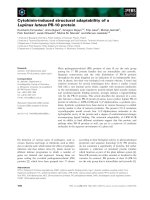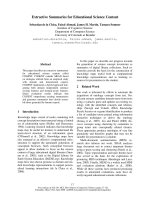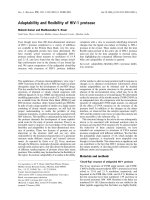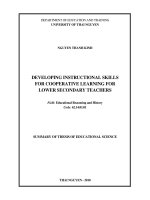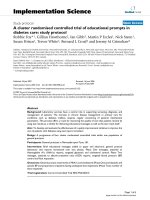Levin educational adaptability lemann
Bạn đang xem bản rút gọn của tài liệu. Xem và tải ngay bản đầy đủ của tài liệu tại đây (4.98 MB, 15 trang )
EDUCATIONAL
ADAPTABILITY
Henry M. Levin
4th Lemann Dialogue
Stanford University
19-21November 2014
Educational Preparation of
Workforce--2050
Workplace
and Employment are
Changing.
New Educational Needs.
How Should We Prepare Students and
Workers to Meet Economic Changes in
Workplace?
What are Alternative Strategies?
Changing Context of Occupations
of Future
Economic
Change (esp. Latin America,
Africa and Asia).
Changing Country Patterns of Growth and
Trade. (e.g. Africa, BRIC countries and
Mexico)
Technology.
New Products and Services.
Organization of Production.
Failure of Educational Planning
Even forecasts for a decade of occupational
employment are poor.
Predicting changes in work requirements based
upon changing technology and organization over
50 year period requires knowledge of a future
that is entirely unknown.
Technological change.
Occupational change
Workplace organizational change.
Education and Labor Productivity-I
Human
Capital.
Education increases skills of numeracy,
literacy, and logic.
Skills increase productivity.
Worker output and quality improve.
Workers
Benefit from Training.
Educated workers learn faster new
responsibilities.
Benefit more from learning by doing.
Education and Labor Productivity II
Educated
workers can make better
resource allocation decisions.
Allocation of own time.
Allocation of other resources of the firm
such as avoiding bottlenecks by using
skills developed in cross-training.
Better allocation of scarce inputs.
Achievement Scores and
Educational Attainment
Test
scores are one measure of skill.
Research shows test scores are related to
worker productivity and earnings.
Relationship is surprisingly modest.
In U.S. number of years of educational
attainment explains about four times as
much of the variance in earnings as do
test scores.
Why is educational attainment so
powerful in explaining productivity?
Students
learn many skills not covered by
the limited way in which we measure
student achievement.
Limited test domains.
Limited methods of measurement.
Educational
attainment imparts noncognitive skills important for worker
productivity such as conscientiousness,
effort, and interpersonal relations.
21st Century Skills and Workplace
Phelps
and Nelson (1966) “Education is
especially important to those functions
requiring adaptation to change.”
Change is what we will face continually in
21st Century.
Rather than educating for narrow
occupations and roles, educating for
adaptability.
Education Goals for Adaptability
Initiative.
Cooperation.
Group
work.
Peer training.
Evaluation.
Reasoning.
Problem solving.
Worker Goals (cont.)
Persistence.
Decision-making.
Information
retrieval and use.
Planning.
Managing
Time.
Learning skills.
Multicultural skills.
Occupational Training
Even with general occupational qualification,
general and specific training will be needed.
Who will do it?
Training is becoming more “general” for industry
rather than specific for firm.
Employer reluctance because firm competes for
talent and resistance of worker to pay for
general training as Becker suggests.
Seek just-in-time workers. P. Capelli.
Paying for Training
Modified
apprenticeships?
Incentives to Firms from Governments.
Industry Associations to Receive Funds
and Train and Certify Workers.
Industry Associations to Retrain and
Recertify.
Underlying Emphasis on Adaptability for
both Training and Work.
Conclusion
Promote
continued expansion of
education.
Movement towards worker adaptability.
Concern with education of immigrants and
those from low-income backgrounds.
Faster growth of these populations.
Need to raise their productive participation.
Serious challenge foreseeable future.
Institutional Challenges
De-emphasize
search for new, rigid
qualifications and seek more general skills
with applications learned on job, training,
and apprenticeships.
Balance between occupational
qualifications and adaptability.
Financing to provide incentives for on-thejob or industry training to use skills
productively.

